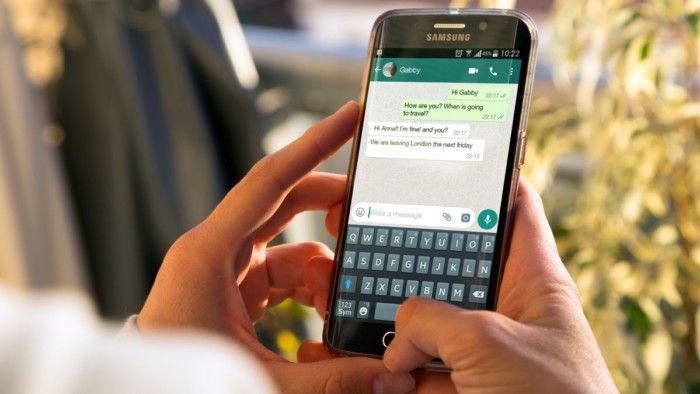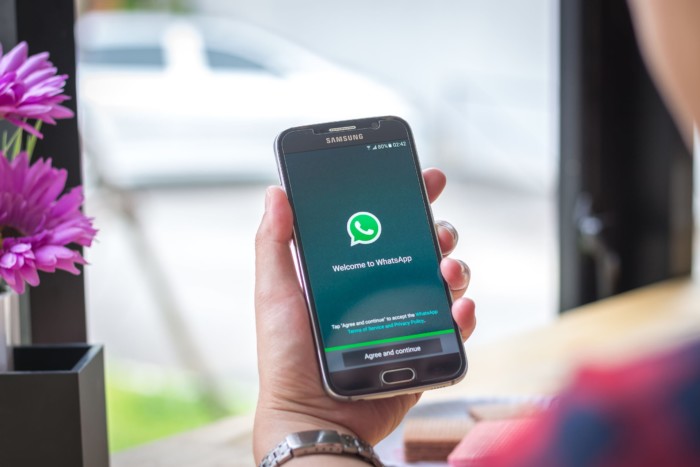Does It Notify When You Unsend a Message on WhatsApp?

DigitalConsumer.org has the resources, staff, expertise and background to help people make informed financial decisions and choices. We've pooled our 25 yrs of combined experiences to ensure we can bring you the most unbiased, well informed content on the internet to help you make the right choices when looking to better your life.
DigitalConsumer.org adheres by strict editorial guidelines - Our readers can rest assured that we’re putting their interests as our top priority. Our articles and content is reviewed and written by industry professionals and edited by qualified subject matter experts, who further ensure all content or topics we publish is accurate, unbiased and trustworthy.
Our skilled contributors and reviewers emphasis their research and data analysis to align with what our readers want and need to learn more about - This includes (but is not limited too) making money on the side, finding information about retailers & online stores, how to earn income on the side and many other subjects of this nature. We strive to help everyone feel confident with their decisions and endeavors.
DigitalConsumer.org adheres by strict editorial guidelines - Our readers can rest assured that we’re putting their interests as our top priority. Our articles and content is reviewed and written by industry professionals and edited by qualified subject matter experts, who further ensure all content or topics we publish is accurate, unbiased and trustworthy.
Our Mission & Principles
We take pride in making it our mission to provide authentic, accurate and unbiased content, articles and data analysis of products and services for our readers. We've set high editorial standards to ensure that we meet and exceed the expectations of adding value to our readers' lives through our recommendations, reviews, comparisons and information. Our review and editorial board fact-checks all content maintain accuracy and integrity before our content is published to uphold our editorial standards. In order to not influence our editorials and contributor teams, we ensure that our contributors and editorial teams do not receive compensation directly from our advertisers.
Editorial Independence
DigitalConsumer’s contributor team and review board has one goal - To give our readers the most unbiased and honest advice to assist in making personal finance choices and decisions - Whether you're looking for services and apps to make extra cash on the side or finding a retailer or business to work with. We've enforced strict editorial guidelines to ensure that information and content presented to our readers on our website is not influenced by our advertisers. As mentioned above, our team of writers, contributors and editors receive no direct compensation from our advertisers, and our articles, content and reviews is properly fact-checked to ensure 100% accuracy.
Our expert team of contributors, writers and review board have a combined experience of over 25 yrs in business, finance and retail. We pride ourselves in helping our readers stay informed on consumer finance, business and retail information.
DigitalConsumer.org adheres and follows strict editorial guidelines, to ensure our readers can trust that our articles, content and reviews are unbiased, accurate and trustworthy.
Digitalconsumer.org is Independently owned, advertising-supported publisher and comparison internet service. We are compensated from advertisers to place ads (in-content, sidebar, and header ads)or by you clicking on affiliate links posted on our website. This compensation may impact where, how and in which order products are listed within categories or in our content. While we continually update and strive to showcase a wide variety products, services and offers, DigitalConsumer.org does not include content or info about every Product, retailer, service or app.
We’ve all been in the position of sending a message that we regret sending and wanting to get rid of it.
But we also know that it will be awkward if we remove the message and the recipient gets a notification saying that the message has been deleted, especially if the recipient has already read the message.
You’re in that moment where you’re quickly debating whether you should delete the message and risk notifying them, or just let it stay and deal with the consequences.
When you send somebody a message on WhatsApp, you can go on to delete that message and have it disappear for you, or disappear for both of you. But there’s a little more to it that’s important to understand before you start deleting messages.
If you’re sending an SMS text message, as soon as you hit “send” then there’s nothing you can do to take it back.
WhatsApp and certain other messaging platforms give you a little more control over what happens after you’ve hit the send button, so here’s what you should know about WhatsApp, message notifications, deleting messages in WhatsApp, and other useful things to keep in mind.
Does WhatsApp Notify When You Unsend a Message?

WhatApp wont send a new notification to alert when you unsend a message, but it will display the text “Message deleted”.
They won’t know what the message said, but they will know that there was a message because there will be a placeholder where the message used to be.
They can’t see the message once it’s deleted, and the original notification that showed a preview of the message on their phone’s lock screen or notification center will disappear.
When you delete the message, they won’t get a new notification on their phone letting them know that you deleted a message, however the message will be gone from your direct message or group chat history, and it will say “message deleted” in the actual chat.
If you manage to delete the message before the recipient has read their notification, then the notification will disappear.
But you can’t really know if they happened to glance at their phone or not, so you could delete the message in WhatsApp before it’s marked as read, and it’s possible they still could have seen it.
If you delete the message before they look at their lock screen or read the message, then the notification will disappear and they’ll have no way of knowing what you said in the now-deleted message.
So, the moral of the story is that if you plan on deleting a message, you should do it as soon as possible (unless they’ve already seen).
If you delete it fast enough, the notification will vanish. The longer you wait, the more likely they are to see it.
After deleting the message, they can still come into the WhatsApp convo with you and see where the message used to be, and that it was deleted, but they won’t know what it said.
Can You Read a WhatsApp Message Without Marking It as Read?
If the status of the message says that it’s still unread, and you delete it, does that mean that there’s a 0% chance they had a chance to read it?
No, unfortunately not. If they received a notification on their phone’s lock screen that showed them a preview of the message, the recipient will have been able to read your message without it being marked as read in WhatsApp.
On the plus side, if you delete the message before they’ve had a chance to see it on their phone’s home screen, then the notification will disappear from their phone.
If they hadn’t seen the notification yet, and they haven’t read the message, then they’ll never be able to find out what it said before you unsent the message.
How To Tell If They’ve Read A WhatsApp Message Before You Delete It
WhatApp tracks the status of each message that is sent. To see the in-depth status on a specific message, put your finger next to the message and swipe to the left. You’ll be able to see when the message was sent, delivered, and read.
If you just look at the message in your DM’s with the person, you can see a small icon in the bottom corner of the message.
If it shows a clock, this means the message hasn’t been delivered yet. If it shows a gray checkmark, the message hasn’t been read yet. If the check marks are blue, then the message has been read.
You can find out when they read the message by swiping to the left, as discussed above.
If the message hasn’t been read yet, and you decide to unsend it, then it will be replaced by a message saying “Message deleted”.
If you delete the message while the small icon is still a clock, meaning that the message hasn’t been delivered nor read yet, then it will just disappear.
Delete For You or Delete For Everyone?
If you want to remove the message from the other person’s phone, then you need to select the “Delete for everyone” option when you delete the message.
Sometimes, if too much time has passed, you’ll only be able to delete the message for yourself and not for everyone.
Again, your best option if you regret sending a message on WhatsApp and you want to get rid of it before the person sees it is to hope that they aren’t sitting near their phone and looking at their lock screen, and to delete it immediately.
In that case, the message will only flash on their screen for a second until you remove it, and unless they’re looking at their phone at that exact moment, or they take a screenshot, it will disappear as soon as you unsend.
Final Thoughts on Notifications for Unsent Messages on WhatsApp

If they’ve already seen the message and read it, or even seen the notification, then there’s not much you can do other than to still go ahead and delete it.
If the message is still “unread” when you delete it, it’s still possible that they’ve seen the notification without actually opening WhatsApp and viewing the message, so there’s no way to know with 100% certainty that your message hasn’t been seen.
The sooner you delete your message, the less likely it is that they’ll have seen it. If you send something and then immediately regret it, the best thing that you can do is to delete it as soon as possible.
They might ask you what the deleted message says, and you can either tell them what it said if you want to, or you can just say that it was a typo and try to move on.
Your unique circumstances and your reasons for deleting the message will determine how serious of a matter this is, but generally speaking, now you know all the basics about what happens when you unsend/delete a message on WhatsApp, and what types of messages and notifications the recipient will see.
